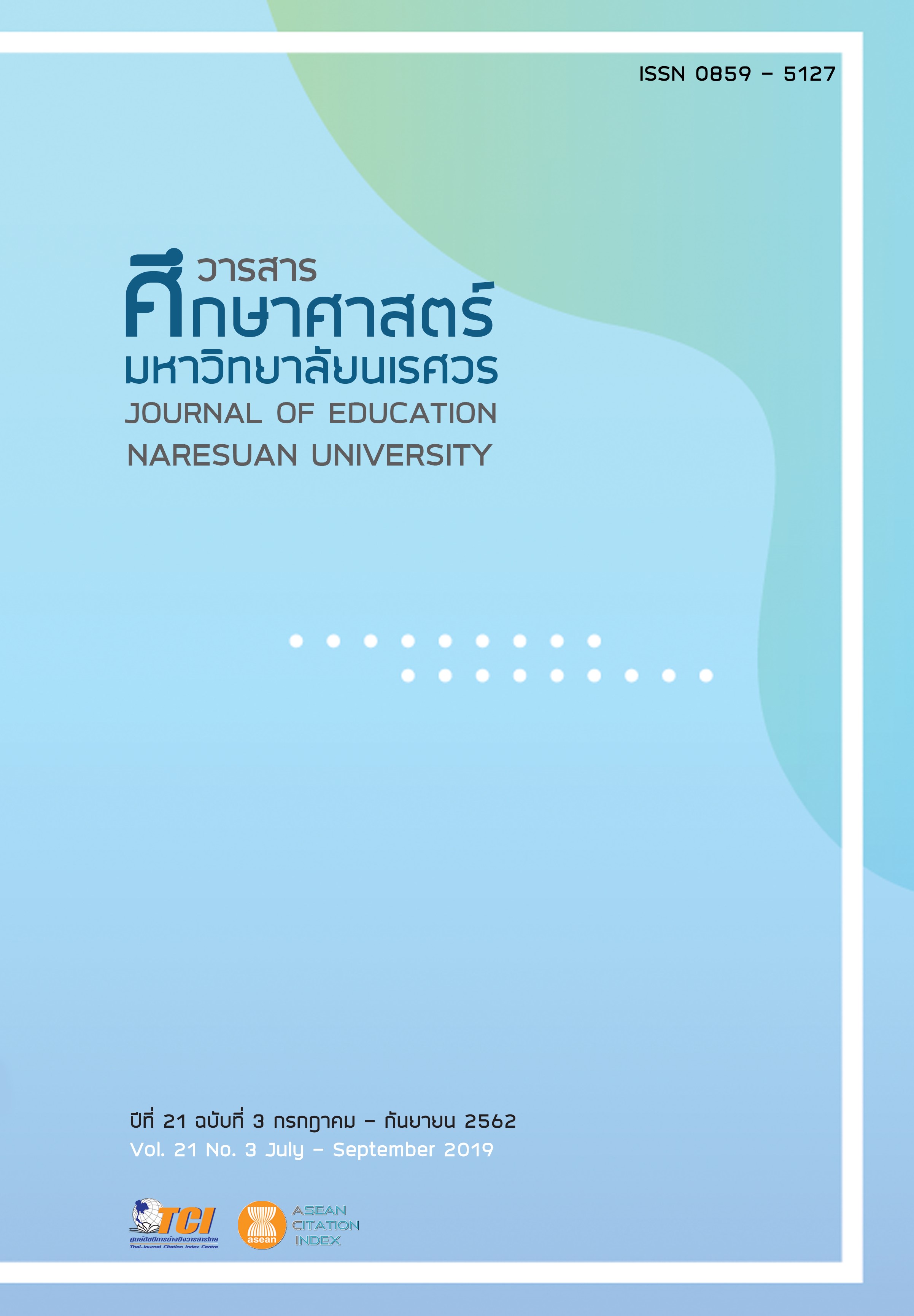การพัฒนากลยุทธ์การบริหารเพื่อยกระดับคุณภาพโรงเรียนส่งเสริมสุขภาพ ของโรงเรียนในสังกัดสำนักงานคณะกรรมการการศึกษาขั้นพื้นฐาน จังหวัดตาก (DEVELOPMENT OF ADMINISTRATIVE STRATEGIES FOR ENHANCING QUALITY OF HEALTH PROMOTING SCHOOLS UNDER THE OFFICE OF THE BASIC EDUCATION COMMISSION IN TAK PROVINCE)
Main Article Content
Abstract
การวิจัยเรื่องนี้ มีวัตถุประสงค์เพื่อพัฒนากลยุทธ์การบริหารเพื่อยกระดับคุณภาพโรงเรียนส่งเสริมสุขภาพ ของโรงเรียนในสังกัดสำนักงานคณะกรรมการการศึกษาขั้นพื้นฐาน จังหวัดตาก ซึ่งมีวิธีดำเนินการวิจัย ขั้นตอนที่ 1 การศึกษาสภาพ ปัญหา และปัจจัยที่เกี่ยวข้องกับการบริหารโรงเรียนส่งเสริมสุขภาพ เก็บรวบรวมข้อมูลกลุ่มตัวอย่างจากบุคลากรของโรงเรียนส่งเสริมสุขภาพ ปีการศึกษา 2557 จำนวน 661 คน โดยใช้แบบสอบถามและการสนทนากลุ่ม วิเคราะห์ข้อมูลโดยการแจกแจงความถี่ หาค่าร้อยละ ค่าเฉลี่ย ค่าเบี่ยงเบนมาตรฐาน และวิเคราะห์เนื้อหา ขั้นตอนที่ 2 ศึกษาการบริหารโรงเรียนส่งเสริมสุขภาพที่ประสบผลสำเร็จ เก็บรวบรวมข้อมูลจากแผนปฏิบัติการประจำปี ระบบการประกันคุณภาพภายใน รายงานประเมินตนเองและการสัมภาษณ์บุคลากรของโรงเรียนส่งเสริมสุขภาพ วิเคราะห์ข้อมูลโดยการวิเคราะห์เนื้อหา ขั้นตอนที่ 3 การพัฒนากลยุทธ์ เก็บรวบรวมข้อมูลโดยการประชุมเชิงปฏิบัติการและการสัมมนาอิงผู้เชี่ยวชาญ (Connoisseurship) จากผู้ทรงคุณวุฒิและผู้เชี่ยวชาญ วิเคราะห์ข้อมูล โดยวิเคราะห์เนื้อหา ขั้นตอนที่ 4 การทดลองและประเมินกลยุทธ์ เก็บรวบรวมข้อมูลโดยใช้แบบประเมินจากผู้ทรงคุณวุฒิ วิเคราะห์ข้อมูลโดยใช้สถิติ t-test (Dependent Samples) และวิเคราะห์ข้อมูลจากค่าเฉลี่ย ค่าเบี่ยงเบนมาตรฐาน ผลการวิจัย พบว่า
1. สภาพการบริหารโรงเรียนส่งเสริมสุขภาพ โดยภาพรวมและรายด้านดำเนินการทุกกิจกรรม และมีปัญหายู่ในระดับมาก ปัจจัยที่เกี่ยวข้องกับการบริหารงานโรงเรียนส่งเสริมสุขภาพ ภาพรวมอยู่ในระดับน้อย ด้านที่มีค่าเฉลี่ยสูงสุด ได้แก่ ด้านบุคลากร ด้านการบริหารจัดการ และด้านเทคโนโลยี
2. การบริหารโรงเรียนส่งเสริมสุขภาพ ของโรงเรียนในสังกัดสำนักงานคณะกรรมการการศึกษาขั้นพื้นฐาน ที่ประสบผลสำเร็จ พบว่า บุคลากรและผู้มีส่วนได้เสียทุกกลุ่มทุกองค์กรที่อยู่ในชุมชนมีส่วนร่วมในการวางแผน การปฏิบัติตามแผน การตรวจสอบ การปรับปรุงแก้ไข และนำระบบเทคโนโลยีและสารสนเทศที่ทันสมัยมาใช้สนับสนุนการบริหารงานทุกขั้นตอน
3. กลยุทธ์การบริหารเพื่อยกระดับคุณภาพโรงเรียนส่งเสริมสุขภาพ ของโรงเรียนในสังกัดสำนักงานคณะกรรมการการศึกษาขั้นพื้นฐาน จังหวัดตาก ที่พัฒนาขึ้น ประกอบด้วย วิสัยทัศน์ 3 พันธกิจ 3 เป้าประสงค์ 3 ประเด็นกลยุทธ์ 10 กลยุทธ์ 19 ตัวชี้วัด และ 58 มาตรการ
4. การทดลองใช้กลยุทธ์ที่พัฒนาขึ้น พบว่าผลการทดลองตามตัวชี้วัดทุกตัวชี้วัดหลังการทดลองมีค่าเฉลี่ยสูงกว่าก่อนการทดลองทุกตัวชี้วัดอย่างมีนัยสำคัญทางสถิติที่ระดับ .05 และผลการประเมินกลยุทธ์มีความสอดคล้อง ความเหมาะสม ความเป็นไปได้ และความเป็นประโยชน์
The purposes of this research was to develop the administrative strategies for enhancing quality of health promoting schools under the Office of Basic Education Commission in Tak Province. The first step was to study the conditions, the problem sand the factors related with the administration of health promoting school, the samples consisted of 661 person sin health promoting schools in the academic year 2014.The research in strumpets we read questionnaire and focus group discussion. The data were analyzed using frequency distribution, percentage means, standard deviation and content analysis. The second step was to study the administration of successful health promoting schools. The research in strumpets were document analysis and an interview. The data were analyzed using content analysis. The third step was to develop the strategies. The research instruments were workshop techniques and connoisseurs conducted with the experts. The data were analyzed using content analysis. The fourth step was to try out and assess the strategies, the research instrument was the assess form conducted with the experts. The data were analyzed using means, standard deviation and t-test (Dependent Samples). The results revealed that:
1. The conditions of the administration of health promoting schools were as follows: both in general and each aspect, all activities were operated, whereas the problem of the administration was at the high level. The factors related with the administration health promoting schools were at the low levels. The highest means were personnel, management and technology.
2. The administration of successful health promoting schools under the Office of Basic Education Commission was found that all personnel’s and stakeholders participated in planning, acting, checking and improving the administration. Modern technology and information were used for all administration.
3. The administrative strategies for enhancing quality of health promoting schools under the Office of Basic Education Commission in Tak Province consisted of a vision, 3 missions, 3 goals, 3 strategic items, 10 strategies, 19 indicators and 58 standards.
4. The implementation of the developing strategies were found that the means of all indicators after being used the strategies was higher than before being used the strategies at the significant statistic at 0.05 level. And the strategies had the agreement, the appropriateness, the possibility and the utility.
Article Details
The owner of the article does not copy or violate any of its copyright. If any copyright infringement occurs or prosecution, in any case, the Editorial Board is not involved in all the rights to the owner of the article to be performed.
References
2. Chaisri, A. (2009). Participation of schools, parents, primary care units, and the local administrative authority in school health: A case study. Ramathibodi Nursing Journal, 17(3), 506-516. [in Thai]
3. Charoenyong, C. (2008). School-based administration of schools in the network center study 13 under the Office of Sakon Nakhon Educational Service Area 2 (Master thesis). Khon Kaen: Khon Kaen University. [in Thai]
4. Chinakarn, N. (2006). Strategic planning process for public relations of state enterprises in Thailand (Master thesis). Bangkok: Chulalongkorn University. [in Thai]
5. Department of Health. (2011). Health promotion school operation manual. Bangkok: Printing Agricultural Cooperative Federation of Thailand. [in Thai]
6. Department of Health. (2006). Guide to the diamond health promotion school. Bangkok: Printing House Agricultural Cooperative Federation of Thailand. [in Thai]
7. Isaranurug, S. (2003). Social development and learning of adolescents and risk management. Bangkok: Parbpim Printing. [in Thai]
8. Kedsuwan, R. (2002). Quality management: From TQC to TQM, ISO 9000 and quality assurance (2nd ed.). Bangkok: Bopit Printing. [in Thai]
9. Office of the National Economic and Social Development Board. (2011). The 11th National Economic and Social Development Plan, 2012-2016. Retrieved April 1, 2014, from http://www.oped.go.th/uploads/files/law/plan_11.pdf [in Thai]
10. Panlainark, N. (2010). Development of a primary school administrative system to promote holistic health and hygiene (Doctoral dissertation). Bangkok: Chulalongkorn University. [in Thai]
11. Rujicheep, P., Wongnaya, S., Pongpinya-opas, S., & Kannil, S. (2016). Strategies for developing life skills of the students in the schools under the office of Kamphaengphet Elementary Education Area 1 and Area 2. Journal of Education Naresuan University, 18(2), 131 – 141. [in Thai]
12. Saikaew, S. (2010). New government management (3rd ed.). Bangkok: Valaya Alongkorn Rajabhat University under the Royal Patronage. [in Thai]
13. Sinthurawet, S. (1999). Go to quality education. Bangkok: Watana Phanit Printing and Publishing. [in Thai]
14. Titakosol, P. (2013). Research management strategy in secondary school under office of the Secondary Educational Service Area Office 41. Kasalongkham Research Journal, 7(2), 89-101. [in Thai]
15. Tungsinsubsiri, T. (2007). Organizational behavior. Bangkok: Thanatat Printing. [in Thai]
16. Vitayaudom, W. (2007). Organization and management. Bangkok: Thanatat Printing. [in Thai]
17. Wasri, P. (2001). Thai social pathology leadership and solutions (6th ed.). Bangkok: Pic-Ganesha Printing Center. [in Thai]
18. Wongnaya, S., & Chaowakeeratiphong, T. (2016). Development of strategic development for quality basic education under the office of the primary education service area. Kamphaengphet Gold: Journal of the Humanities and Social Sciences, 22(1), 41-56. [in Thai]


